A Report on Emerging Themes of Digital Disruption in Oil & Gas
VerifiedAdded on 2020/06/05
|7
|2346
|275
Report
AI Summary
This report delves into the concept of digital disruption within the oil and gas industry, analyzing how emerging technologies are transforming existing business practices. It highlights the misinterpretation of 'disruption' as solely negative, emphasizing the positive alterations brought about by innovative digital advancements. The report discusses the industry's focus on leveraging digital technology, the concerns surrounding its implementation, and the benefits observed in other sectors. It explores the impact of automation, including robotics and AI, on the workforce and the role of cloud computing and computer capabilities in developments like seismic processing. The report examines the contrasting views on digital technologies, the emergence of companies like Netflix, Amazon, Google, and Apple, and the potential for digital disruption to be an asset. It also explores the implementation of digital technologies, the need for bold strategies, and the importance of key performance indicators. The report concludes by projecting the future impact of digital disruption, including increased efficiency, automation, and improved customer relationships, ultimately emphasizing the need for organizations to adapt and view digital transformation as an opportunity for innovation. The report references multiple research papers and journals to support its claims.

EMERGING THEMES
Paraphrase This Document
Need a fresh take? Get an instant paraphrase of this document with our AI Paraphraser
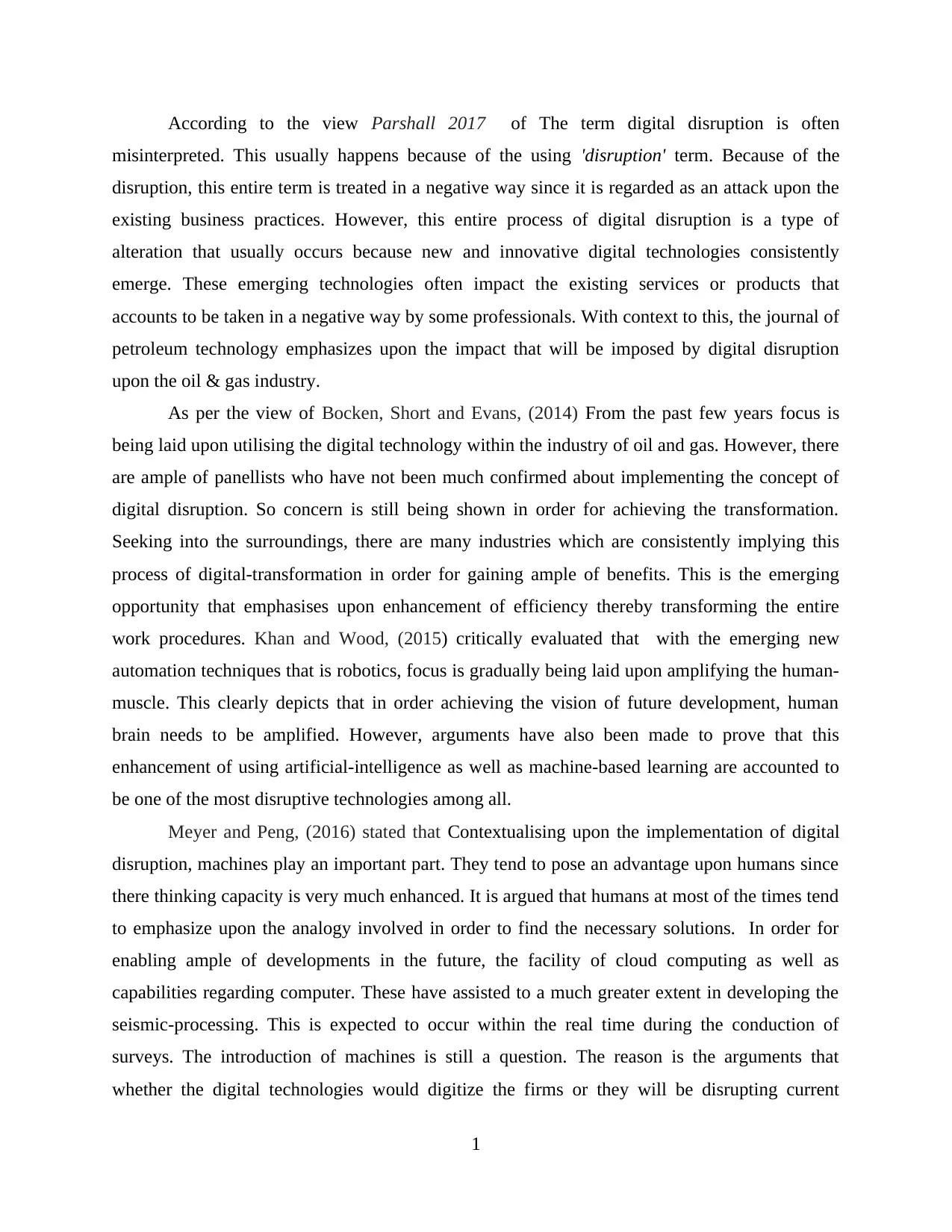
According to the view Parshall 2017 of The term digital disruption is often
misinterpreted. This usually happens because of the using 'disruption' term. Because of the
disruption, this entire term is treated in a negative way since it is regarded as an attack upon the
existing business practices. However, this entire process of digital disruption is a type of
alteration that usually occurs because new and innovative digital technologies consistently
emerge. These emerging technologies often impact the existing services or products that
accounts to be taken in a negative way by some professionals. With context to this, the journal of
petroleum technology emphasizes upon the impact that will be imposed by digital disruption
upon the oil & gas industry.
As per the view of Bocken, Short and Evans, (2014) From the past few years focus is
being laid upon utilising the digital technology within the industry of oil and gas. However, there
are ample of panellists who have not been much confirmed about implementing the concept of
digital disruption. So concern is still being shown in order for achieving the transformation.
Seeking into the surroundings, there are many industries which are consistently implying this
process of digital-transformation in order for gaining ample of benefits. This is the emerging
opportunity that emphasises upon enhancement of efficiency thereby transforming the entire
work procedures. Khan and Wood, (2015) critically evaluated that with the emerging new
automation techniques that is robotics, focus is gradually being laid upon amplifying the human-
muscle. This clearly depicts that in order achieving the vision of future development, human
brain needs to be amplified. However, arguments have also been made to prove that this
enhancement of using artificial-intelligence as well as machine-based learning are accounted to
be one of the most disruptive technologies among all.
Meyer and Peng, (2016) stated that Contextualising upon the implementation of digital
disruption, machines play an important part. They tend to pose an advantage upon humans since
there thinking capacity is very much enhanced. It is argued that humans at most of the times tend
to emphasize upon the analogy involved in order to find the necessary solutions. In order for
enabling ample of developments in the future, the facility of cloud computing as well as
capabilities regarding computer. These have assisted to a much greater extent in developing the
seismic-processing. This is expected to occur within the real time during the conduction of
surveys. The introduction of machines is still a question. The reason is the arguments that
whether the digital technologies would digitize the firms or they will be disrupting current
1
misinterpreted. This usually happens because of the using 'disruption' term. Because of the
disruption, this entire term is treated in a negative way since it is regarded as an attack upon the
existing business practices. However, this entire process of digital disruption is a type of
alteration that usually occurs because new and innovative digital technologies consistently
emerge. These emerging technologies often impact the existing services or products that
accounts to be taken in a negative way by some professionals. With context to this, the journal of
petroleum technology emphasizes upon the impact that will be imposed by digital disruption
upon the oil & gas industry.
As per the view of Bocken, Short and Evans, (2014) From the past few years focus is
being laid upon utilising the digital technology within the industry of oil and gas. However, there
are ample of panellists who have not been much confirmed about implementing the concept of
digital disruption. So concern is still being shown in order for achieving the transformation.
Seeking into the surroundings, there are many industries which are consistently implying this
process of digital-transformation in order for gaining ample of benefits. This is the emerging
opportunity that emphasises upon enhancement of efficiency thereby transforming the entire
work procedures. Khan and Wood, (2015) critically evaluated that with the emerging new
automation techniques that is robotics, focus is gradually being laid upon amplifying the human-
muscle. This clearly depicts that in order achieving the vision of future development, human
brain needs to be amplified. However, arguments have also been made to prove that this
enhancement of using artificial-intelligence as well as machine-based learning are accounted to
be one of the most disruptive technologies among all.
Meyer and Peng, (2016) stated that Contextualising upon the implementation of digital
disruption, machines play an important part. They tend to pose an advantage upon humans since
there thinking capacity is very much enhanced. It is argued that humans at most of the times tend
to emphasize upon the analogy involved in order to find the necessary solutions. In order for
enabling ample of developments in the future, the facility of cloud computing as well as
capabilities regarding computer. These have assisted to a much greater extent in developing the
seismic-processing. This is expected to occur within the real time during the conduction of
surveys. The introduction of machines is still a question. The reason is the arguments that
whether the digital technologies would digitize the firms or they will be disrupting current
1
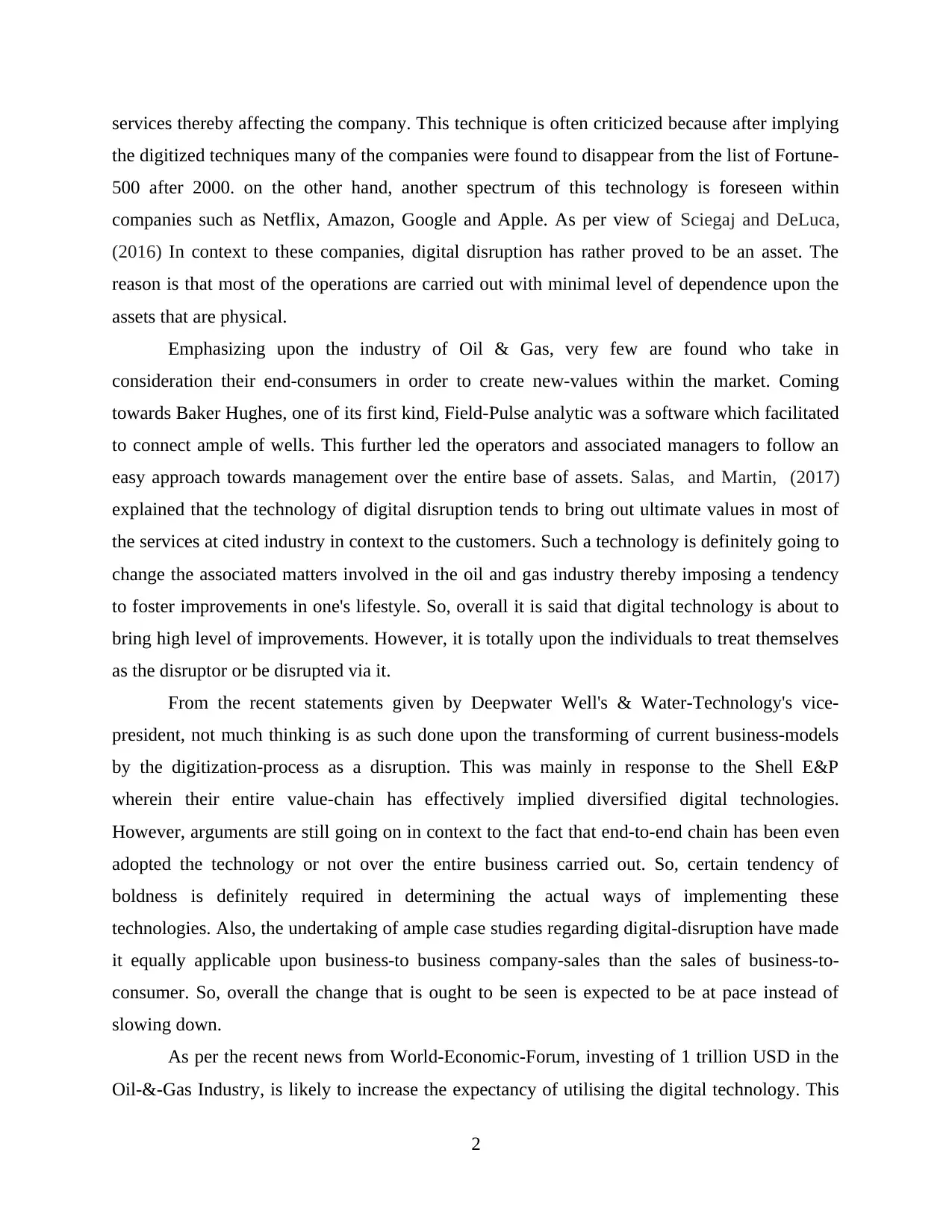
services thereby affecting the company. This technique is often criticized because after implying
the digitized techniques many of the companies were found to disappear from the list of Fortune-
500 after 2000. on the other hand, another spectrum of this technology is foreseen within
companies such as Netflix, Amazon, Google and Apple. As per view of Sciegaj and DeLuca,
(2016) In context to these companies, digital disruption has rather proved to be an asset. The
reason is that most of the operations are carried out with minimal level of dependence upon the
assets that are physical.
Emphasizing upon the industry of Oil & Gas, very few are found who take in
consideration their end-consumers in order to create new-values within the market. Coming
towards Baker Hughes, one of its first kind, Field-Pulse analytic was a software which facilitated
to connect ample of wells. This further led the operators and associated managers to follow an
easy approach towards management over the entire base of assets. Salas, and Martin, (2017)
explained that the technology of digital disruption tends to bring out ultimate values in most of
the services at cited industry in context to the customers. Such a technology is definitely going to
change the associated matters involved in the oil and gas industry thereby imposing a tendency
to foster improvements in one's lifestyle. So, overall it is said that digital technology is about to
bring high level of improvements. However, it is totally upon the individuals to treat themselves
as the disruptor or be disrupted via it.
From the recent statements given by Deepwater Well's & Water-Technology's vice-
president, not much thinking is as such done upon the transforming of current business-models
by the digitization-process as a disruption. This was mainly in response to the Shell E&P
wherein their entire value-chain has effectively implied diversified digital technologies.
However, arguments are still going on in context to the fact that end-to-end chain has been even
adopted the technology or not over the entire business carried out. So, certain tendency of
boldness is definitely required in determining the actual ways of implementing these
technologies. Also, the undertaking of ample case studies regarding digital-disruption have made
it equally applicable upon business-to business company-sales than the sales of business-to-
consumer. So, overall the change that is ought to be seen is expected to be at pace instead of
slowing down.
As per the recent news from World-Economic-Forum, investing of 1 trillion USD in the
Oil-&-Gas Industry, is likely to increase the expectancy of utilising the digital technology. This
2
the digitized techniques many of the companies were found to disappear from the list of Fortune-
500 after 2000. on the other hand, another spectrum of this technology is foreseen within
companies such as Netflix, Amazon, Google and Apple. As per view of Sciegaj and DeLuca,
(2016) In context to these companies, digital disruption has rather proved to be an asset. The
reason is that most of the operations are carried out with minimal level of dependence upon the
assets that are physical.
Emphasizing upon the industry of Oil & Gas, very few are found who take in
consideration their end-consumers in order to create new-values within the market. Coming
towards Baker Hughes, one of its first kind, Field-Pulse analytic was a software which facilitated
to connect ample of wells. This further led the operators and associated managers to follow an
easy approach towards management over the entire base of assets. Salas, and Martin, (2017)
explained that the technology of digital disruption tends to bring out ultimate values in most of
the services at cited industry in context to the customers. Such a technology is definitely going to
change the associated matters involved in the oil and gas industry thereby imposing a tendency
to foster improvements in one's lifestyle. So, overall it is said that digital technology is about to
bring high level of improvements. However, it is totally upon the individuals to treat themselves
as the disruptor or be disrupted via it.
From the recent statements given by Deepwater Well's & Water-Technology's vice-
president, not much thinking is as such done upon the transforming of current business-models
by the digitization-process as a disruption. This was mainly in response to the Shell E&P
wherein their entire value-chain has effectively implied diversified digital technologies.
However, arguments are still going on in context to the fact that end-to-end chain has been even
adopted the technology or not over the entire business carried out. So, certain tendency of
boldness is definitely required in determining the actual ways of implementing these
technologies. Also, the undertaking of ample case studies regarding digital-disruption have made
it equally applicable upon business-to business company-sales than the sales of business-to-
consumer. So, overall the change that is ought to be seen is expected to be at pace instead of
slowing down.
As per the recent news from World-Economic-Forum, investing of 1 trillion USD in the
Oil-&-Gas Industry, is likely to increase the expectancy of utilising the digital technology. This
2
⊘ This is a preview!⊘
Do you want full access?
Subscribe today to unlock all pages.

Trusted by 1+ million students worldwide
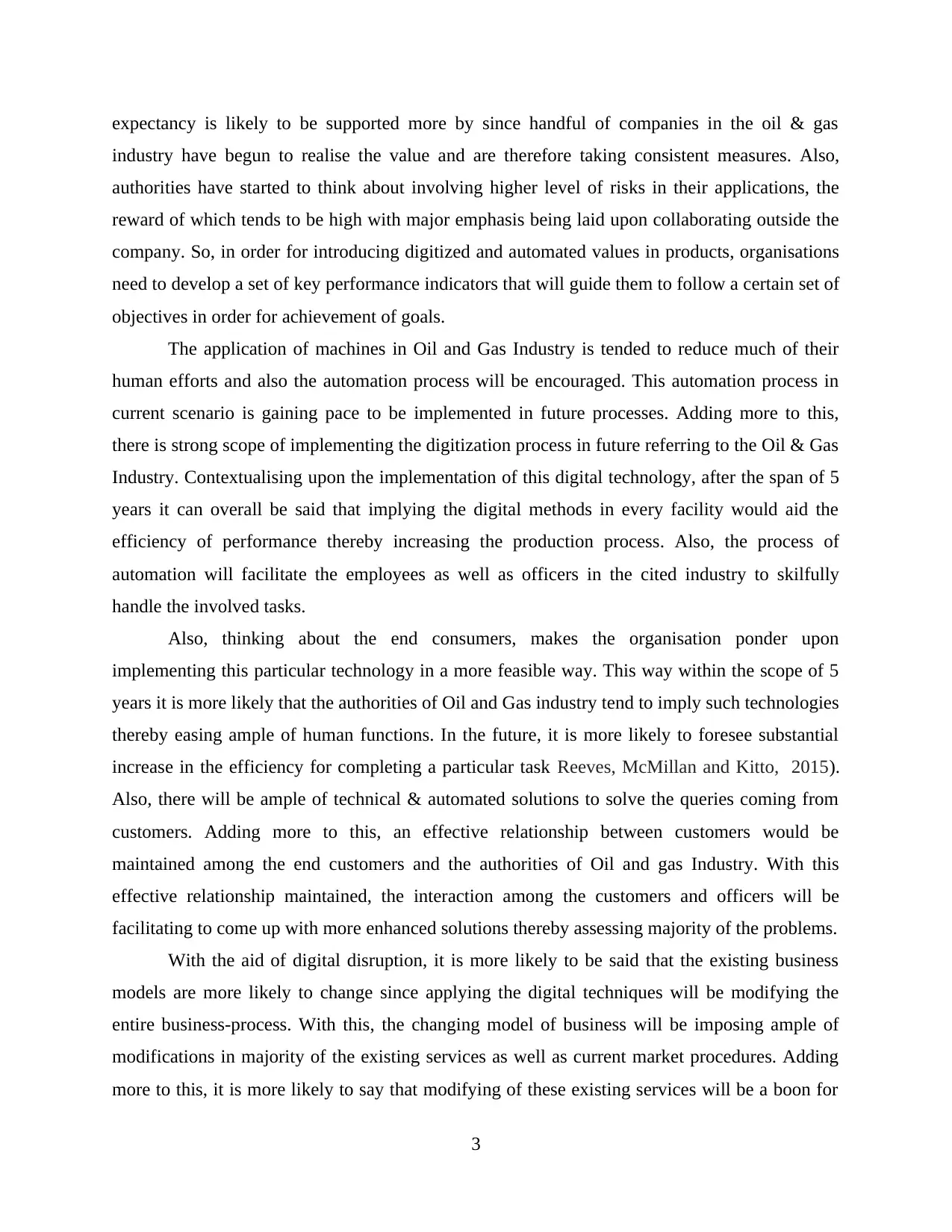
expectancy is likely to be supported more by since handful of companies in the oil & gas
industry have begun to realise the value and are therefore taking consistent measures. Also,
authorities have started to think about involving higher level of risks in their applications, the
reward of which tends to be high with major emphasis being laid upon collaborating outside the
company. So, in order for introducing digitized and automated values in products, organisations
need to develop a set of key performance indicators that will guide them to follow a certain set of
objectives in order for achievement of goals.
The application of machines in Oil and Gas Industry is tended to reduce much of their
human efforts and also the automation process will be encouraged. This automation process in
current scenario is gaining pace to be implemented in future processes. Adding more to this,
there is strong scope of implementing the digitization process in future referring to the Oil & Gas
Industry. Contextualising upon the implementation of this digital technology, after the span of 5
years it can overall be said that implying the digital methods in every facility would aid the
efficiency of performance thereby increasing the production process. Also, the process of
automation will facilitate the employees as well as officers in the cited industry to skilfully
handle the involved tasks.
Also, thinking about the end consumers, makes the organisation ponder upon
implementing this particular technology in a more feasible way. This way within the scope of 5
years it is more likely that the authorities of Oil and Gas industry tend to imply such technologies
thereby easing ample of human functions. In the future, it is more likely to foresee substantial
increase in the efficiency for completing a particular task Reeves, McMillan and Kitto, 2015).
Also, there will be ample of technical & automated solutions to solve the queries coming from
customers. Adding more to this, an effective relationship between customers would be
maintained among the end customers and the authorities of Oil and gas Industry. With this
effective relationship maintained, the interaction among the customers and officers will be
facilitating to come up with more enhanced solutions thereby assessing majority of the problems.
With the aid of digital disruption, it is more likely to be said that the existing business
models are more likely to change since applying the digital techniques will be modifying the
entire business-process. With this, the changing model of business will be imposing ample of
modifications in majority of the existing services as well as current market procedures. Adding
more to this, it is more likely to say that modifying of these existing services will be a boon for
3
industry have begun to realise the value and are therefore taking consistent measures. Also,
authorities have started to think about involving higher level of risks in their applications, the
reward of which tends to be high with major emphasis being laid upon collaborating outside the
company. So, in order for introducing digitized and automated values in products, organisations
need to develop a set of key performance indicators that will guide them to follow a certain set of
objectives in order for achievement of goals.
The application of machines in Oil and Gas Industry is tended to reduce much of their
human efforts and also the automation process will be encouraged. This automation process in
current scenario is gaining pace to be implemented in future processes. Adding more to this,
there is strong scope of implementing the digitization process in future referring to the Oil & Gas
Industry. Contextualising upon the implementation of this digital technology, after the span of 5
years it can overall be said that implying the digital methods in every facility would aid the
efficiency of performance thereby increasing the production process. Also, the process of
automation will facilitate the employees as well as officers in the cited industry to skilfully
handle the involved tasks.
Also, thinking about the end consumers, makes the organisation ponder upon
implementing this particular technology in a more feasible way. This way within the scope of 5
years it is more likely that the authorities of Oil and Gas industry tend to imply such technologies
thereby easing ample of human functions. In the future, it is more likely to foresee substantial
increase in the efficiency for completing a particular task Reeves, McMillan and Kitto, 2015).
Also, there will be ample of technical & automated solutions to solve the queries coming from
customers. Adding more to this, an effective relationship between customers would be
maintained among the end customers and the authorities of Oil and gas Industry. With this
effective relationship maintained, the interaction among the customers and officers will be
facilitating to come up with more enhanced solutions thereby assessing majority of the problems.
With the aid of digital disruption, it is more likely to be said that the existing business
models are more likely to change since applying the digital techniques will be modifying the
entire business-process. With this, the changing model of business will be imposing ample of
modifications in majority of the existing services as well as current market procedures. Adding
more to this, it is more likely to say that modifying of these existing services will be a boon for
3
Paraphrase This Document
Need a fresh take? Get an instant paraphrase of this document with our AI Paraphraser
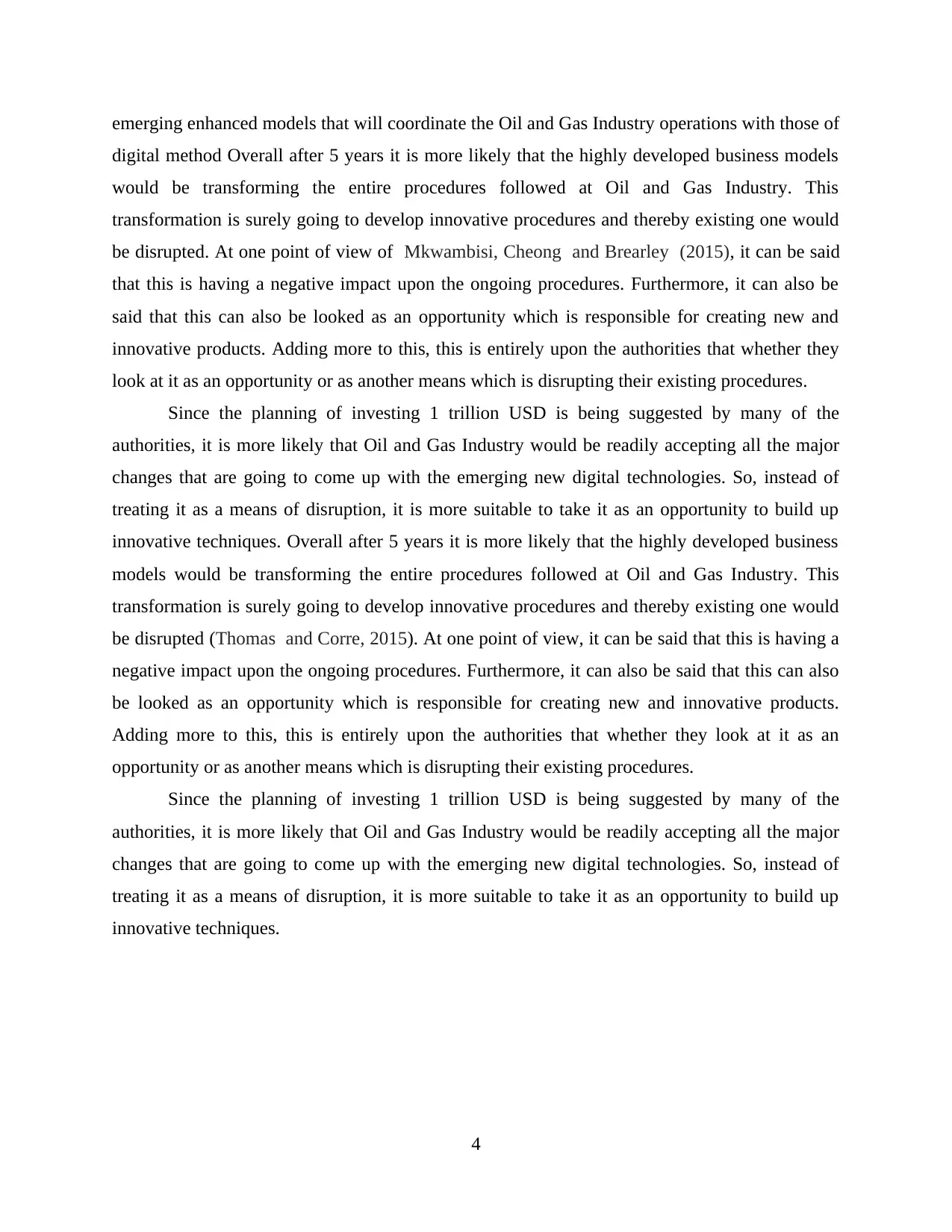
emerging enhanced models that will coordinate the Oil and Gas Industry operations with those of
digital method Overall after 5 years it is more likely that the highly developed business models
would be transforming the entire procedures followed at Oil and Gas Industry. This
transformation is surely going to develop innovative procedures and thereby existing one would
be disrupted. At one point of view of Mkwambisi, Cheong and Brearley (2015), it can be said
that this is having a negative impact upon the ongoing procedures. Furthermore, it can also be
said that this can also be looked as an opportunity which is responsible for creating new and
innovative products. Adding more to this, this is entirely upon the authorities that whether they
look at it as an opportunity or as another means which is disrupting their existing procedures.
Since the planning of investing 1 trillion USD is being suggested by many of the
authorities, it is more likely that Oil and Gas Industry would be readily accepting all the major
changes that are going to come up with the emerging new digital technologies. So, instead of
treating it as a means of disruption, it is more suitable to take it as an opportunity to build up
innovative techniques. Overall after 5 years it is more likely that the highly developed business
models would be transforming the entire procedures followed at Oil and Gas Industry. This
transformation is surely going to develop innovative procedures and thereby existing one would
be disrupted (Thomas and Corre, 2015). At one point of view, it can be said that this is having a
negative impact upon the ongoing procedures. Furthermore, it can also be said that this can also
be looked as an opportunity which is responsible for creating new and innovative products.
Adding more to this, this is entirely upon the authorities that whether they look at it as an
opportunity or as another means which is disrupting their existing procedures.
Since the planning of investing 1 trillion USD is being suggested by many of the
authorities, it is more likely that Oil and Gas Industry would be readily accepting all the major
changes that are going to come up with the emerging new digital technologies. So, instead of
treating it as a means of disruption, it is more suitable to take it as an opportunity to build up
innovative techniques.
4
digital method Overall after 5 years it is more likely that the highly developed business models
would be transforming the entire procedures followed at Oil and Gas Industry. This
transformation is surely going to develop innovative procedures and thereby existing one would
be disrupted. At one point of view of Mkwambisi, Cheong and Brearley (2015), it can be said
that this is having a negative impact upon the ongoing procedures. Furthermore, it can also be
said that this can also be looked as an opportunity which is responsible for creating new and
innovative products. Adding more to this, this is entirely upon the authorities that whether they
look at it as an opportunity or as another means which is disrupting their existing procedures.
Since the planning of investing 1 trillion USD is being suggested by many of the
authorities, it is more likely that Oil and Gas Industry would be readily accepting all the major
changes that are going to come up with the emerging new digital technologies. So, instead of
treating it as a means of disruption, it is more suitable to take it as an opportunity to build up
innovative techniques. Overall after 5 years it is more likely that the highly developed business
models would be transforming the entire procedures followed at Oil and Gas Industry. This
transformation is surely going to develop innovative procedures and thereby existing one would
be disrupted (Thomas and Corre, 2015). At one point of view, it can be said that this is having a
negative impact upon the ongoing procedures. Furthermore, it can also be said that this can also
be looked as an opportunity which is responsible for creating new and innovative products.
Adding more to this, this is entirely upon the authorities that whether they look at it as an
opportunity or as another means which is disrupting their existing procedures.
Since the planning of investing 1 trillion USD is being suggested by many of the
authorities, it is more likely that Oil and Gas Industry would be readily accepting all the major
changes that are going to come up with the emerging new digital technologies. So, instead of
treating it as a means of disruption, it is more suitable to take it as an opportunity to build up
innovative techniques.
4
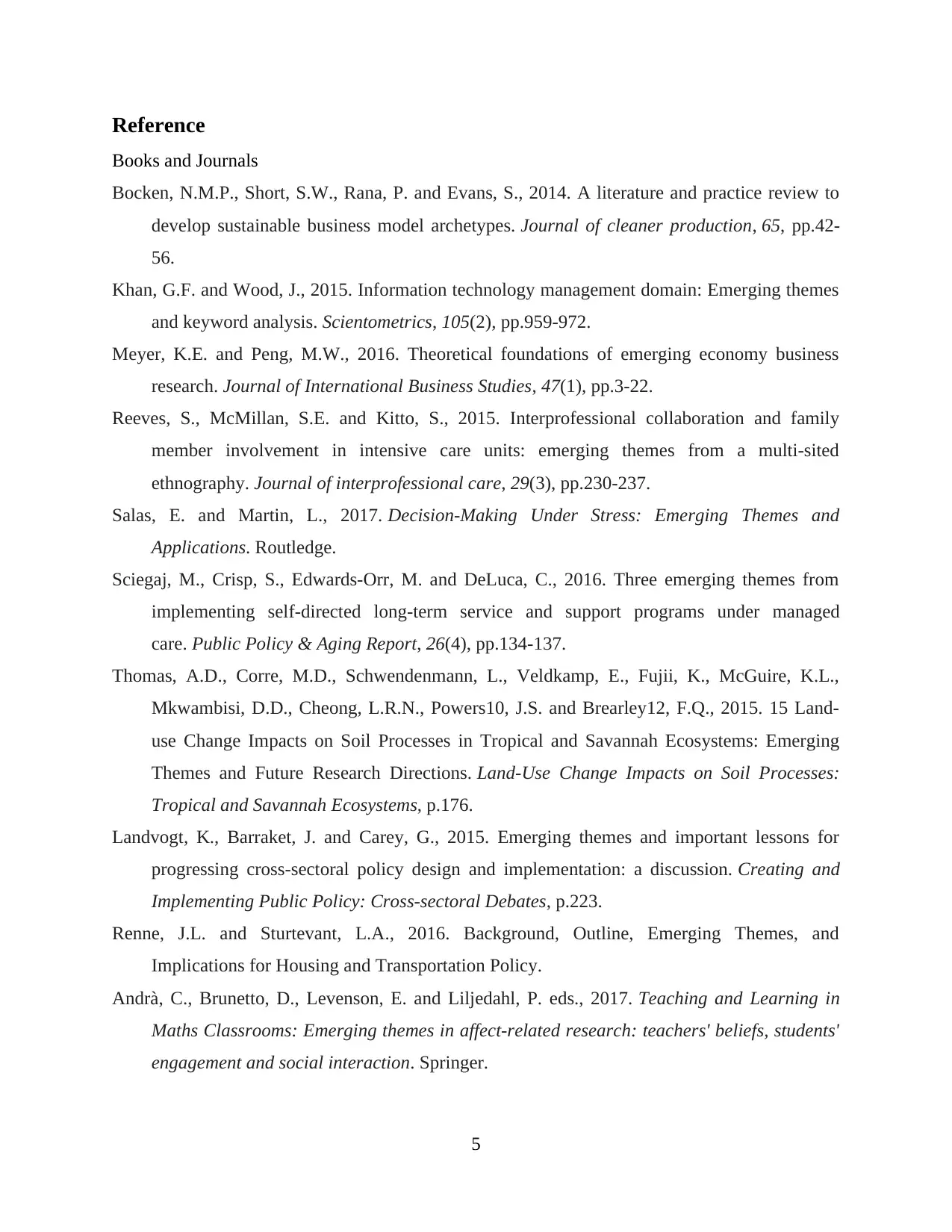
Reference
Books and Journals
Bocken, N.M.P., Short, S.W., Rana, P. and Evans, S., 2014. A literature and practice review to
develop sustainable business model archetypes. Journal of cleaner production, 65, pp.42-
56.
Khan, G.F. and Wood, J., 2015. Information technology management domain: Emerging themes
and keyword analysis. Scientometrics, 105(2), pp.959-972.
Meyer, K.E. and Peng, M.W., 2016. Theoretical foundations of emerging economy business
research. Journal of International Business Studies, 47(1), pp.3-22.
Reeves, S., McMillan, S.E. and Kitto, S., 2015. Interprofessional collaboration and family
member involvement in intensive care units: emerging themes from a multi-sited
ethnography. Journal of interprofessional care, 29(3), pp.230-237.
Salas, E. and Martin, L., 2017. Decision-Making Under Stress: Emerging Themes and
Applications. Routledge.
Sciegaj, M., Crisp, S., Edwards-Orr, M. and DeLuca, C., 2016. Three emerging themes from
implementing self-directed long-term service and support programs under managed
care. Public Policy & Aging Report, 26(4), pp.134-137.
Thomas, A.D., Corre, M.D., Schwendenmann, L., Veldkamp, E., Fujii, K., McGuire, K.L.,
Mkwambisi, D.D., Cheong, L.R.N., Powers10, J.S. and Brearley12, F.Q., 2015. 15 Land-
use Change Impacts on Soil Processes in Tropical and Savannah Ecosystems: Emerging
Themes and Future Research Directions. Land-Use Change Impacts on Soil Processes:
Tropical and Savannah Ecosystems, p.176.
Landvogt, K., Barraket, J. and Carey, G., 2015. Emerging themes and important lessons for
progressing cross-sectoral policy design and implementation: a discussion. Creating and
Implementing Public Policy: Cross-sectoral Debates, p.223.
Renne, J.L. and Sturtevant, L.A., 2016. Background, Outline, Emerging Themes, and
Implications for Housing and Transportation Policy.
Andrà, C., Brunetto, D., Levenson, E. and Liljedahl, P. eds., 2017. Teaching and Learning in
Maths Classrooms: Emerging themes in affect-related research: teachers' beliefs, students'
engagement and social interaction. Springer.
5
Books and Journals
Bocken, N.M.P., Short, S.W., Rana, P. and Evans, S., 2014. A literature and practice review to
develop sustainable business model archetypes. Journal of cleaner production, 65, pp.42-
56.
Khan, G.F. and Wood, J., 2015. Information technology management domain: Emerging themes
and keyword analysis. Scientometrics, 105(2), pp.959-972.
Meyer, K.E. and Peng, M.W., 2016. Theoretical foundations of emerging economy business
research. Journal of International Business Studies, 47(1), pp.3-22.
Reeves, S., McMillan, S.E. and Kitto, S., 2015. Interprofessional collaboration and family
member involvement in intensive care units: emerging themes from a multi-sited
ethnography. Journal of interprofessional care, 29(3), pp.230-237.
Salas, E. and Martin, L., 2017. Decision-Making Under Stress: Emerging Themes and
Applications. Routledge.
Sciegaj, M., Crisp, S., Edwards-Orr, M. and DeLuca, C., 2016. Three emerging themes from
implementing self-directed long-term service and support programs under managed
care. Public Policy & Aging Report, 26(4), pp.134-137.
Thomas, A.D., Corre, M.D., Schwendenmann, L., Veldkamp, E., Fujii, K., McGuire, K.L.,
Mkwambisi, D.D., Cheong, L.R.N., Powers10, J.S. and Brearley12, F.Q., 2015. 15 Land-
use Change Impacts on Soil Processes in Tropical and Savannah Ecosystems: Emerging
Themes and Future Research Directions. Land-Use Change Impacts on Soil Processes:
Tropical and Savannah Ecosystems, p.176.
Landvogt, K., Barraket, J. and Carey, G., 2015. Emerging themes and important lessons for
progressing cross-sectoral policy design and implementation: a discussion. Creating and
Implementing Public Policy: Cross-sectoral Debates, p.223.
Renne, J.L. and Sturtevant, L.A., 2016. Background, Outline, Emerging Themes, and
Implications for Housing and Transportation Policy.
Andrà, C., Brunetto, D., Levenson, E. and Liljedahl, P. eds., 2017. Teaching and Learning in
Maths Classrooms: Emerging themes in affect-related research: teachers' beliefs, students'
engagement and social interaction. Springer.
5
⊘ This is a preview!⊘
Do you want full access?
Subscribe today to unlock all pages.

Trusted by 1+ million students worldwide
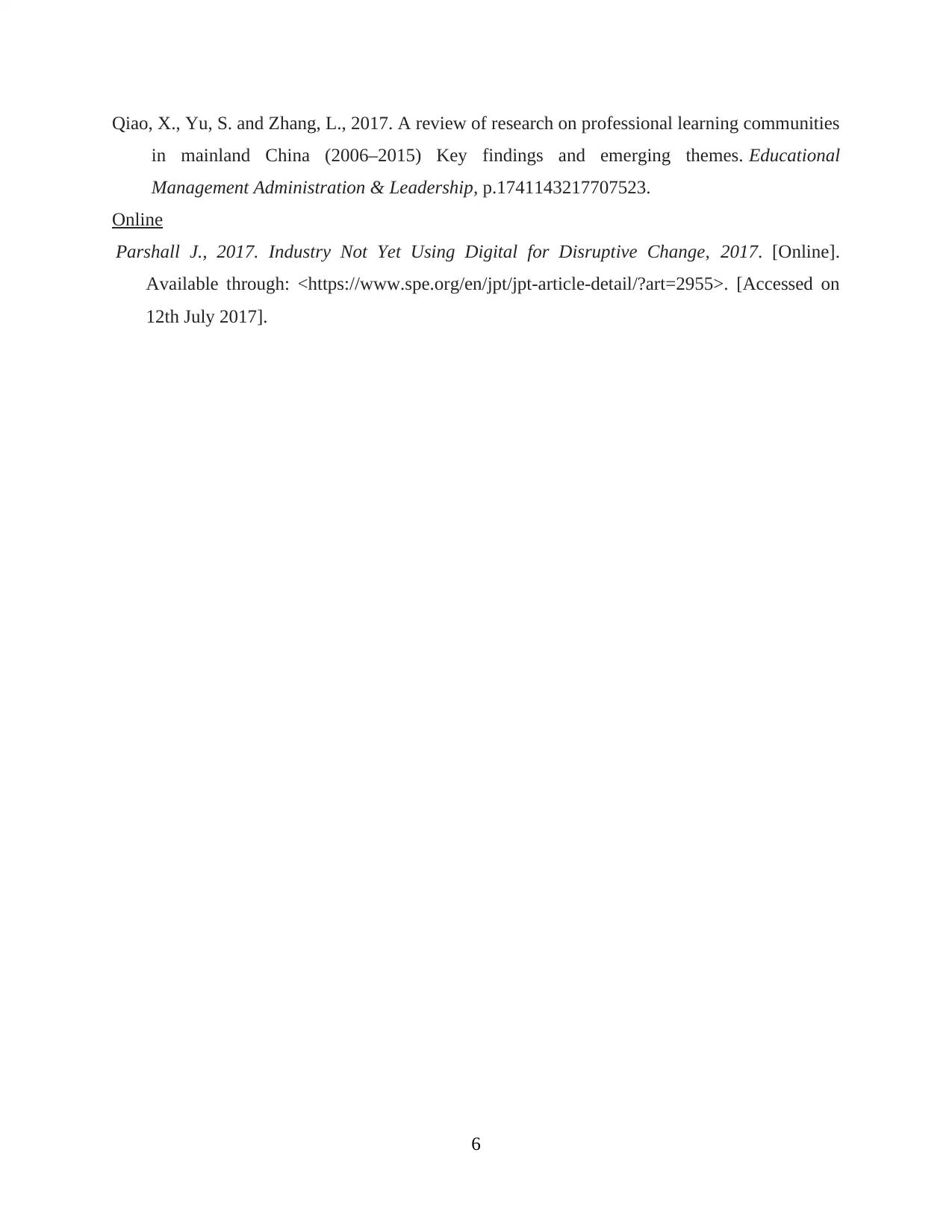
Qiao, X., Yu, S. and Zhang, L., 2017. A review of research on professional learning communities
in mainland China (2006–2015) Key findings and emerging themes. Educational
Management Administration & Leadership, p.1741143217707523.
Online
Parshall J., 2017. Industry Not Yet Using Digital for Disruptive Change, 2017. [Online].
Available through: <https://www.spe.org/en/jpt/jpt-article-detail/?art=2955>. [Accessed on
12th July 2017].
6
in mainland China (2006–2015) Key findings and emerging themes. Educational
Management Administration & Leadership, p.1741143217707523.
Online
Parshall J., 2017. Industry Not Yet Using Digital for Disruptive Change, 2017. [Online].
Available through: <https://www.spe.org/en/jpt/jpt-article-detail/?art=2955>. [Accessed on
12th July 2017].
6
1 out of 7
Your All-in-One AI-Powered Toolkit for Academic Success.
+13062052269
info@desklib.com
Available 24*7 on WhatsApp / Email
![[object Object]](/_next/static/media/star-bottom.7253800d.svg)
Unlock your academic potential
Copyright © 2020–2025 A2Z Services. All Rights Reserved. Developed and managed by ZUCOL.
